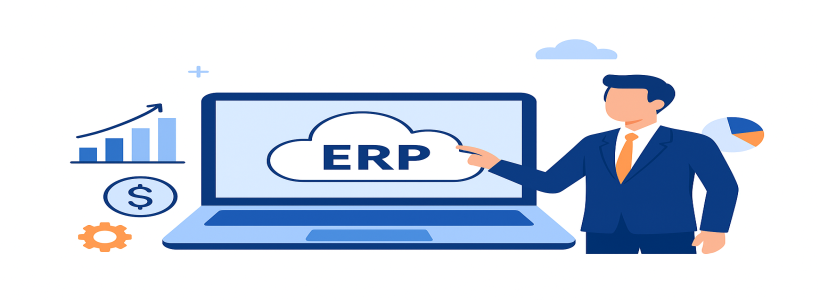Top 10 ERP Software Solutions for Businesses in 2025

Running a business in 2025 means managing data, people, and processes more smartly than ever. Enterprise Resource Planning (ERP) software helps companies combine finance, HR, supply chain, sales, and customer data in one system. It reduces errors, speeds up work, and gives management clear insights. Below we look at ten ERP software solutions that can help businesses grow and stay competitive.
1. EduAutomate ERP
EduAutomate is an advanced yet easy-to-use ERP platform designed for educational institutions and training businesses. It offers modules for admissions, fees, HR, inventory, payroll, and online learning in one system. With real-time dashboards and mobile access, EduAutomate improves transparency between management, staff, students, and parents. It also supports automated notifications, online payments, and compliance reporting, making day-to-day administration smoother. Whether you run a single institute or a group of schools, EduAutomate scales with your needs and saves time for your team.
2. SAP S/4HANA
SAP S/4HANA is a globally trusted ERP platform built for large and mid-size companies. It uses in-memory technology for faster analytics and supports finance, supply chain, HR, and customer management. Cloud and on-premise options allow flexible deployment.
3. Oracle NetSuite
NetSuite is a popular cloud-based ERP designed for fast-growing companies. It combines accounting, CRM, e-commerce, and inventory into one system. Its dashboards give real-time financial data, making decision-making easier for managers and owners anywhere in the world.
4. Microsoft Dynamics 365 Business Central
Microsoft Dynamics 365 Business Central brings ERP and CRM together with tight Microsoft 365 integration. Its ideal for small and medium businesses that want budgeting, inventory, and sales features in one system without heavy IT costs.
5. Odoo ERP
Odoo is an open-source ERP platform offering dozens of modules, from accounting to manufacturing. Companies can start with a few apps and expand as they grow. Its affordability and customization make it attractive to SMEs in different sectors.
6. Infor CloudSuite
Infor CloudSuite is a flexible cloud ERP for industries like manufacturing, healthcare, and distribution. It focuses on user-friendly design and built-in analytics. Automatic updates keep businesses compliant with regulations and improve security without heavy maintenance.
7. Acumatica Cloud ERP
Acumatica provides a scalable cloud ERP solution for growing businesses. It offers financial, distribution, project, and CRM modules with a pay-for-resources model. Its mobile-friendly interface helps teams work anytime and anywhere.
8. Epicor Kinetic ERP
Epicor Kinetic (formerly Epicor ERP) is built for manufacturing and distribution companies. It supports production planning, inventory control, and supply chain management. Its modern interface and cloud deployment reduce IT costs while improving visibility across operations.
9. Sage X3
Sage X3 is a robust ERP designed for medium to large businesses that need strong finance, supply chain, and manufacturing control. It offers fast implementation, multi-currency support, and detailed reporting across multiple locations.
10. Workday ERP
Workday is known for its HR and finance strengths. It gives businesses a single system for workforce management, payroll, and financial planning. Its AI-driven insights help companies make better decisions about people and budgets.
Why Choosing the Right ERP Matters
Selecting the right ERP in 2025 is about more than features. Its about scalability, support, and how well it fits your sector. Cloud-based solutions are popular because they require less IT infrastructure and provide updates automatically. Integrations with CRM, HR, and e-commerce tools are also key for a smooth workflow.
Conclusion
ERP software is no longer only for big corporations. With flexible pricing, mobile apps, and cloud hosting, even small and medium businesses can benefit. From global giants like SAP and Oracle to specialized solutions like EduAutomate, theres a system to fit every need. Choosing the right ERP can cut costs, increase productivity, and give you a clear edge in todays competitive market.
-
12 September, 2025 at 9:47 amAppreciate your effort in writing this article. The content is informative and gave me a better idea about the topic.
-
10 September, 2025 at 3:48 amhis article is full of useful details. Thank you for writing and explaining everything in such a simple wa
Add a Comment
Your email address will not be published. Required fields are marked *
Categories
Popular Posts
![Customer, Lead, or Deal? Understanding CRM Sections for Smarter Sales [thumb]](https://blogimages.weblink.in/customer-lead-or-deal-understanding-crm-sections-for-smarter-sales-350x128.jpg)
Customer, Lead, or Deal? Understanding CRM Sections for Smarter Sales
![How EduAutomate Brings Real-Time Visibility to All Admin Operations? [thumb]](https://blogimages.weblink.in/how-eduautomate-brings-real-time-visibility-to-all-admin-operations-350x128.jpg)
How EduAutomate Brings Real-Time Visibility to All Admin Operations?
![How CRM Vendor Management Enhances Your Procurement Process [thumb]](https://blogimages.weblink.in/how-crm-vendor-management-enhances-your-procurement-process-350x128.jpg)